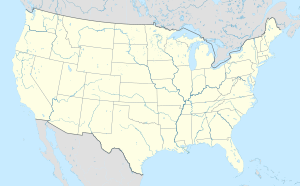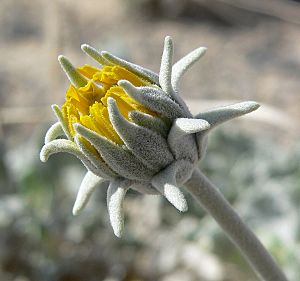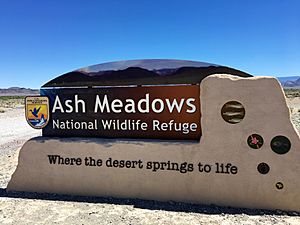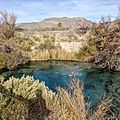Ash Meadows National Wildlife Refuge facts for kids
Quick facts for kids Ash Meadows National Wildlife Refuge |
|
|---|---|
|
IUCN Category IV (Habitat/Species Management Area)
|
|
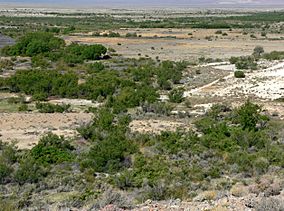
Ash Meadows habitat, in the Amargosa Desert.
|
|
| Location | Nye County, Nevada, United States |
| Nearest city | Pahrump, Nevada |
| Area | 23,000 acres (93 km2) |
| Established | 1984 |
| Governing body | U.S. Fish and Wildlife Service |
| Website | Ash Meadows National Wildlife Refuge |
| Designated: | 18 December 1986 |
| Reference #: | 347 |
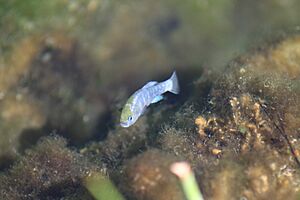
The Ash Meadows National Wildlife Refuge is a special place in Nevada that protects amazing desert wildlife. It's like a rare desert oasis, full of water and unique plants and animals.
This protected area is in Nye County, in the southwestern part of Nevada. It is located right next to Death Valley National Park. The city of Las Vegas is about 90 miles (145 km) away to the east-northwest.
The refuge was created on June 18, 1984. Its main goal is to protect this very special desert oasis. The U.S. Fish and Wildlife Service manages the refuge.
Contents
About the Refuge
The Ash Meadows National Wildlife Refuge covers about 23,000 acres (93 square kilometers). It is part of a bigger group of protected lands called the Desert National Wildlife Refuge Complex. This complex also includes other refuges like Desert National Wildlife Refuge.
Ash Meadows is found within the Amargosa Desert. This desert is part of the larger Mojave Desert area. The Amargosa River flows through the valley. It has water on the surface during certain times of the year. This water eventually flows into Death Valley.
A Special Desert Oasis
Ash Meadows is a truly unique example of a desert oasis. These watery places are very rare in the southwestern deserts. The refuge is a major spot where water from a huge underground water system comes to the surface. This underground water system stretches more than 100 miles (160 km) to the northeast.
Water-filled rock layers come up to the surface in over thirty seeps and springs. These create many different kinds of wet habitats. Almost all the water at Ash Meadows is "fossil water." This means it entered the ground tens of thousands of years ago.
Many small streams and wetlands are spread across the refuge. In the northern and western parts, you can see what's left of Carson Slough. This area was once drained to mine for its peat. You can also find sand dunes in the western and southern parts of the refuge.
Unique Plants and Animals
The Ash Meadows National Wildlife Refuge was set up to protect at least twenty-six endemic plants and animals. "Endemic" means they are found nowhere else in the entire world. Four types of fish and one plant here are currently listed as endangered species.
This high number of unique plants and animals makes Ash Meadows very special. It has the most endemic living things in any local area in the United States. It also has the second-highest concentration of local endemic species in all of North America.
Endemic Plants
Many plants are found only at Ash Meadows. Some of these include:
- Ash Meadows sunray (Enceliopsis nudicaulis var. corrugata)
- Ash Meadows blazingstar (Mentzelia leucophylla)
- Ash Meadows gumplant (Grindelia fraxino-pratensis)
- Ash Meadows milkvetch (Astragalus phoenix)
- Amargosa niterwort (Nitrophila mohavensis)
- Spring-loving centaury (Zeltnera namophila)
New Discoveries
In 2010, scientists from Utah State University announced an exciting discovery. They found two new species of bees at Ash Meadows. These bees belong to the genus Perdita.
Images for kids
See also
 In Spanish: Refugio nacional de vida silvestre de Ash Meadows para niños
In Spanish: Refugio nacional de vida silvestre de Ash Meadows para niños
 | Shirley Ann Jackson |
 | Garett Morgan |
 | J. Ernest Wilkins Jr. |
 | Elijah McCoy |


